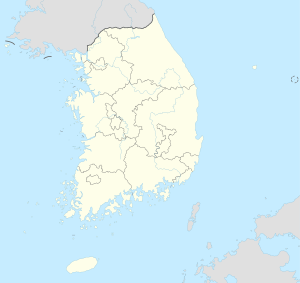
Back برنامج كوريا الجنوبية النووي Arabic Kernenergie in Südkorea German Energía nuclear en Corea del Sur Spanish Tenaga nuklir di Korea Selatan ID Energia nucleare in Corea del Sud Italian 韓国の原子力発電所 Japanese 대한민국의 원자력 발전 Korean Ядерная энергетика Республики Корея Russian Ядерна енергетика Південної Кореї Ukrainian 韩国核能 Chinese
Nuclear power is a major power source in South Korea, providing 29% of the country's electricity.[1] The total electrical generation capacity of the nuclear power plants of South Korea is 20.5 GWe from 23 reactors, equivalent to 22% of South Korea's total electrical generation capacity.[1]
In 2012 South Korea had plans for significant expansion of its nuclear power industry, and to increase nuclear's share of generation to 60% by 2035.[2] Eleven more reactors were scheduled to come online in the period 2012 to 2021, adding 13.8 GWe in total.[3] However, in 2013 the government submitted a reduced draft plan to parliament for nuclear output of up to 29% of generation capacity by 2035, following several scandals related to falsification of safety documentation.[1] This plan still involved increasing 2035 nuclear capacity by 7 GWe, to 43 GWe.[4]
| 2011 | 2012 | 2013 | 2014 | 2015 | 2016 | 2027 | 2018 | 2019 | 2020 | 2021 |
| 1.47 | 1.42 | 1.31 | 1.46 | 1.53 | 1.50 | 1.36 | 1.22 | 1.33 | 1.45 | 1.43 |
However, responding to widespread public concerns after the Fukushima Daiichi nuclear disaster in Japan, the high earthquake risk in South Korea, and the nuclear scandals, the new government of President Moon Jae-in elected in 2017 decided to gradually phase out nuclear power. The three reactors currently under construction will be completed, but the government decided these will be the last built, and as the existing plants close at a 40 years end-of-life they will be replaced with other modes of generation.[6][7] In 2020 it was planned that the number of nuclear reactors would be reduced to 17 by 2034, after a peak of 26 in 2024.[8] However, nuclear policy was again reversed in 2023 by president Yoon Suk-yeol, resuming construction of nuclear reactors and expanding nuclear output to 34.6% share of South Korea electricity generation by 2036.[9]
Nuclear power research in South Korea is very active with projects involving a variety of advanced reactors, including a small modular reactor, a liquid-metal fast/nuclear transmutation reactor, and a high-temperature hydrogen generation design. Fuel production and waste handling technologies have also been developed locally. South Korea is also a member of the ITER nuclear fusion research project.
South Korea is seeking to export its nuclear technology, with a goal of exporting 80 nuclear reactors by 2030. As of 2010[update], South Korean companies have reached agreements to build a research reactor in Jordan, and four APR-1400 reactors in the United Arab Emirates.[10]
South Korea is poised to enhance its nuclear power infrastructure to meet increasing electricity demands and achieve its emission reduction objectives. According to a 2022 government proposal, the nation intends to increase its nuclear power generation by adding 4.9 gigawatts by 2038, which complements the ongoing construction of 5.6 gigawatts. The plan includes three new reactors, each with a capacity of 1.4 gigawatts, and a 700-megawatt small modular reactor, aiming to make nuclear energy the dominant electricity source. This expansion aligns with President Yoon Suk Yeol’s 2022 pledge to boost nuclear energy use and reduce carbon emissions by 40% from 2018 levels by 2030.[11]
- ^ a b c "Nuclear to remain Korean mainstay". World Nuclear News. 10 December 2013. Retrieved 12 December 2013.
- ^ Lee, Hee-Yong (8 February 2012). "Seoul's nuclear solution". Gulf News. Retrieved 24 February 2012.
- ^ "Nuclear Power in Korea". Information Papers. World Nuclear Association (WNA). February 2012. Retrieved 2012-02-23.
- ^ Simon Mundy (14 January 2014). "South Korea cuts target for nuclear power". Financial Times. Retrieved 19 January 2014.
- ^ Statistical Review of World Energy (PDF) (70th ed.). London: BP (published 2021-07-08). 2021. Retrieved 2024-06-01.
- ^ Kidd, Steve (30 January 2018). "Nuclear new build - where does it stand today?". Nuclear Engineering International. Retrieved 12 February 2018.
- ^ "Korea's nuclear phase-out policy takes shape". World Nuclear News. 19 June 2017. Retrieved 12 February 2018.
- ^ "South Korea confirms energy policy favouring renewables". Nuclear Engineering International. 12 May 2020. Retrieved 20 May 2020.
- ^ "South Korea increases expected contribution of nuclear power : Nuclear Policies". World Nuclear News. 12 January 2023. Retrieved 13 January 2023.
- ^ Cite error: The named reference
apj-20100322was invoked but never defined (see the help page). - ^ Lee, Heesu (May 31, 2024). "South Korea Power Plan Eyes Nuclear, Renewables as Demand Surges". www.bloomberg.com. Retrieved 2024-06-01.
© MMXXIII Rich X Search. We shall prevail. All rights reserved. Rich X Search
